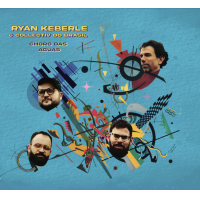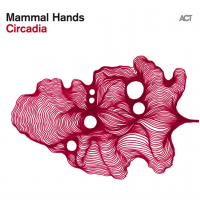Home » Jazz Articles » Album Review » Ryan Keberle & Collectiv do Brasil: Choro das Aguas
Ryan Keberle & Collectiv do Brasil: Choro das Aguas
Ryan acquiesced, and it has served him well. He was playing in adult big bands at 15, and is on some 25 albums as a side man with a host of bandleaders, including Maria Schneider (who became an important mentor), Darcy James Argue, Rufus Reid, Miguel Zenon, Dave Douglas, Alicia Keys, David Byrne and David Bowie.
Keberle has released 18 projects as leader of five ensembles. He has an undergraduate degree from the Manhattan School of Music and was among the first to receive an artist diploma in jazz from Juilliard, staying in New York thereafter to accept a job in jazz studies at Hunter College.
An obsession with 1970s MPB
Big band jazz continues to have an important role in his career, but for many years Keberle has also had an "obsession with música popular brasileira (MPB) of the 1970s" (Brian Pace Report, 2019).On sabbatical from Hunter, Keberle spent time in Brazil and connected with the São Paulo-based rhythm team of pianist Felipe Silveira, bassist Thiago Alves and drummer Paulinho Vicente, who became his Collectiv do Brasil. Sonhos da Esquina (Alternate Side, 2022), the first fruit of their collaboration, focuses on music of Milton Nascimento, Toninho Horta and their influential Minas Gerais-based circle, the Clube da Esquina. More on that album is here.
Released in 2023, the Collectiv do Brasil's Considerando (Alternate Side) offered jazz takes on tunes by singer-composer Edu Lobo, again centering on works from the '70s, this time with Felipe Brisola on bass. Keberle fell in love with "that early and mid-70s period when there was this explosion of the most creative songwriting [when] so many of the Brazilian songwriters were able to do their thing," he emphasized in liner notes. More on that project is here.
Rei do Carnaval
The '70s were repressive times for musicians in Brazil, though. 'Doing your thing' could result in surveillance, censorship and exile (or worse) during the military regime (1964-1985), as it did for Gilberto Gil, Caetano Veloso, Chico Buarque and Lobo. Many artists worked to harness their creativity, protesting the regime in covert ways, evading censors (to the extent possible) while still connecting with fans seeking to express their desire for democracy.Choro das Aguas, Collectivo do Brasil's third record with Alternate Side, continues the tribute theme with a release on the occasion of singer-composer Ivan Lins' 80th birthday. Again focusing on the '70s, Keberle arranged several tunes from Lins' Modo Livre (RCA Victor, 1974), Lins' fourth album, which marked a political awakening for him, and established what would become his long partnership with lyricist Vitor Martins.
Resistance was masked in metaphor, with tunes like "Rei do Carnaval" (lyric by Paulo César Pinheiro) referring simultaneously to the king of carnaval and the fragile nature of political power, which—as the lyric insists—remains in the hands of the people first ("o povo é o rei primeiro"). There are 'no kings' in a democracy, as we might say in the US.
Lins' musical canvas is lush and diverse, with voices grouped in choirs of various sorts along with strings, electric guitar, bass and drums.
Keberle maintains Lins' idea of profusion in his own rendition, enriching the harmonies and applying a different palette: acoustic bass takes the lead first, followed by trombone and piano. Silveira, Brisola and Vicente create a groove that is driving but rarely loud. Keberle's arrangement of "Rei do Carnaval" enhances the tune with the addition of solo sections in shifting textures and feels, delicately set to create beautiful spaces for the band's sensitive and elegant improvisations.
Trombone as lyrical lead
Choro das Aguas is a singular amalgam of arrangements, impressions and lovely original material, where the trombone often takes the role of lead singer. It can be difficult to translate vocal music for instruments, more so when lyrics are in an unfamiliar language and the bite of social commentary is integral to the ethos, as it is in much of his '70s MPB source material. But as Keberle said in liner notes to Considerando, "I've discovered how much I love to play the role of vocalist."And he, like Lins, had a turning point, a moment where he felt compelled to speak out. Following the US presidential election in which Hillary Clinton was defeated in an upset, Keberle released Find the Common: Shine a Light (Greenleaf Music, 2017). His setting of Bob Dylan's "The Times They Are a-Changin'" (Columbia, 1964) is a highlight of the program, in an interpretation by his group Catharsis, with singer-guitarist Camila Meza, trumpeter Mike Rodriguez, bassist Jorge Roeder and drummer Eric Doob that begins with an insistent droning and builds to a collective free improvisation.
Já está chegando a hora (Times are a-changin')
Coincidentally, Lins' "Abre Alas"*—a lasting favorite from Modo Livre—bears a Martins lyric that is strikingly reminiscent of the perennial Dylan piece. Both optimistic and demanding, it addresses an openness ("abertura politica") and eventual redemocratization promised by General Ernesto Geisel, the regime's newly-instated leader in 1974 (but not fully realized until 1985): "Abre alas pra minha bandeira, já está chegando a hora" / Open up for my flag, the time has come. Tellingly, even in New York, in a duo performance with Lins and guitarist Leo Amuedo at the Blue Note nearly 30 years later (2003), Brazilian fans remembered "Abre Alas" well enough to join in on "já está chegando a hora" (which could easily be translated as "the times are a-changin'"), each of the dozen-or-so times the lyric came around.Keberle, like Lins, was reluctant to express his political views publicly or artistically at first. And sure enough, Find the Common was praised for it in some circles and criticized in others (e.g., here). In 2025, as the US slides into authoritarianism, there are reasons to look at ways in which our musical predecessors have negotiated comparably tough times.
By focusing on a particular moment in Brazilian popular music situated historically dead center in a grindingly long military dictatorship, Keberle's collaborations with Collectiv do Brasil call our attention to the problem, whether intentionally or not. Lins has threaded the needle, slipping through cracks to create extraordinary works that have alternately responded to changing times and essential ideas of beauty. Keberle might be poised to follow suit.
*****
*The title of Lins' "Abre Alas" makes reference to choro composer Chiquinha Gonzaga's "Ó Abre Alas (1899), the first published marchinha de carnaval (carnaval march), which remains an indispensable piece of carnaval repertoire.
Track Listing
Rei do Carnaval; Noites Sertanejas; Quintessence; Choro das Aguas; Saindo de Mim; Essa Mare; Sai de Baixo; Tens - Long Life; Lua Cirandeira; Simple Sermon
Personnel
Ryan Keberle
tromboneFelipe Silveira
pianoFelipe Brisola
bass, acousticPaulinho Vicente
drumsRyan Keberle's Collectiv do Brasil
band / ensemble / orchestraAlbum information
Title: Choro das Aguas | Year Released: 2025 | Record Label: Alternate Side Records
Tags
PREVIOUS / NEXT
Support All About Jazz
 All About Jazz has been a pillar of jazz since 1995, championing it as an art form and, more importantly, supporting the musicians who make it. Our enduring commitment has made "AAJ" one of the most culturally important websites of its kind, read by hundreds of thousands of fans, musicians and industry figures every month.
All About Jazz has been a pillar of jazz since 1995, championing it as an art form and, more importantly, supporting the musicians who make it. Our enduring commitment has made "AAJ" one of the most culturally important websites of its kind, read by hundreds of thousands of fans, musicians and industry figures every month.






















